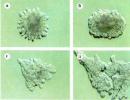The main idea is the first fish
Veronika Savelyeva
Retelling of the story by E. Permyak "The First Fish"
To teach children paraphrase a literary text using the author's expressive means.
Develop the ability to listen to the teacher's questions and answer them
Draw the children's attention to how the meaning of the word changes from the use of different suffixes.
Learn to evaluate phrases by meaning.
Practice choosing synonyms.
Develop creative imagination.
Cultivate an attentive attitude towards elders, the desire to help them.
Course progress.
Educator. Guys, how many of you know what fishing is? Today I want to introduce you story, which talks about family fishing. The story was written by. Permyak, is called « First fish» .
Reading story followed by discussion
(Text story presented in the appendix)
Questions to the text:
Why is this text called « story» ?
What does it say story?
What family did Yura live in? (Yura lived in a large and friendly family.)
Where did Yuri's family go? (to catch fish and cook fish soup) How else can you say this? (Fishing, fishing.)
How many fish did Yura catch?
What words are named in short story Yurin catch? (Ruff, big ruff, tiny ruff.) From text: “Because our ear is tasty, that Yura caught a huge ruff. Because our ear is fat and rich, because the ruff is fatter than catfish.
Why the same the fish in the story is called differently: then "big ruff", then "tiny ruff"? (Because when they were joking, they wanted to exaggerate what really happened, so they picked up such words. Not just big, but "big", not just ruff, but "ruff". And Yura understood the joke, realized that in reality everything is different. Here are the words used with the opposite meaning: not "big ruff", a "tiny ruff"- the teacher should formulate this conclusion when the children answer.)
Why was Yura happy?
And now we will also try to fish together.
Coordination of speech with movement « Rybka» .
The fish swims in the water,
The fish is fun to play.
Rybka, small fish, mischievous,
We want to catch you.
The fish bent its back,
I took a crumb of bread;
The fish wagged its tail,
The fish quickly swam away
Educator. Yura wrote a letter to a friend about his fishing. But a friend didn't understand some the words: (explain the meaning of the words)
ear (fish soup)
around (near, next to, next to)
praise (praise a lot)
ruff (big fish)
navarista, navar (this is water in the ear with fish fat, the fatter the fish, the more broth in the ear)
And now let's remember what Yura wrote to a friend. I will read story, and you think with what words Yura wrote the letter.
Re-reading story.
Didactic game "Make an offer"
Educator. This is a magic fishing rod that will turn you into Yura boy.
I will ask you questions, and you will answer in full sentences.
Questions:
What did Yura write about his family? (I live in a large and friendly family)
How did he write about where his family went? (Once my family went to fish and cook fish soup)
How many fish did Yuri's family catch? (My family caught a lot of fish)
How he wrote about his catch (I'm alone too caught a fish. Ruff.)
To whom did they give all the catch? (They gave all the fish to my grandmother.)
What was cooked from fish? (An ear was boiled from fish.)
Where did the whole family eat fish soup? (My whole family sat down on the shore around the bowler hat)
What is the ear like? (The ear turned out, tasty, fatty, but rich.)
What was Yura's mood like? (I was in a joyful and cheerful mood)
Why was Yura happy? (I rejoiced because in the big family ear there was also my little small fish).
Educator. Guys, I will now read the text again, and you try to remember it, so that later you can retell.
After retellings a collective assessment is carried out. The teacher asks which of the children told interesting, expressively, used the author's words and expressions.
Educator. V the story is told"tiny ruff". How can you say otherwise? Choose words that are similar in meaning to the word tiny (small, tiny).
Educator. What is the opposite word for small?
Educator. What words say about "ruff"? Yes, "big ruff". Let's put it another way. Pick up the word "big" words that are close in meaning (huge, enormous).
Educator. What do you think, is it possible to tell: "big brush"? Why do you think it's impossible? Can you say "tiny ruff"? Why can't you say that?
Educator. What else can be said "tiny" what happens tiny?. And what happens to be bigger? (Children make up phrases; the teacher monitors the correct agreement of adjectives with nouns.)
Pronunciation of tongue twisters in different tempe: “There are reeds on the river - ruffs danced there”.
The teacher sums up, praises the children for their work in class.
Appendix.
First fish
E.A. Permyak
Yura lived in a large and friendly family. Everyone in this family worked. Only one Yura did not work. He was only five years old.
Once Yurina's family went to fish and cook fish soup. They caught a lot of fish and gave them all to my grandmother. Yura is also alone caught a fish. Ruff. I also gave it to my grandmother. For the ear.
Grandma cooked the ear. The whole family on the shore around the bowler sat down and let's go praise:
That's why our fish soup is tasty because Yura caught a huge ruff. Because our ear is fat and rich, because the ruff is fatter than catfish.
And even though Yura was small, he understood that adults were joking. Is there a lot of fat from a tiny ruff? But he still rejoiced. He rejoiced because his little one was in the big family ear. small fish.
Target: the formation of the ability to retell the literary text.
Educational:
To form the ability to retell a literary text, using the author's expressive means according to a given plan, in a chain, individually;
Pay attention to how the meaning of the word changes from the use of different suffixes;
Improve the ability to consciously and arbitrarily build speech statements about the content of the work;
Exercise in the selection of synonyms and antonyms in speech.
Developing:
Develop interest and love for the book;
Continue to develop the ability to listen to the interlocutor, fully and accurately express their thoughts;
Develop creative imagination.
Educational:
Cultivate an attentive attitude towards elders, the desire to help them.
The course of activity.
1. Guys, today I have prepared a lot of interesting things for you. To begin with, I suggest that you come to the table and guess what task you need to complete.
(Children are offered split pictures.)
That's right, you collect and tell me what I want to talk to you about.
What did you put together? (children name their fish).
Where do fish live? (in river, sea, ocean)
So what are they? (marine,……)
Name marine, river fish.
What do fish have in common?
Do all fish have gills? What are these fish called?
Look at the pictures and tell me what kind of fish do you see? Arrange the pictures into groups according to the habitat of the fish. (Classification.)
Guys, tell me, what is the water like? I call you a word, and you call it with the opposite meaning.
D / game "Say the opposite"
Hot - Cold
Cool - Warm
Clean - Dirty
Boiled - Raw
Salty - Fresh
Stormy - Calm
Transparent - Cloudy
What can people do with fish?
2. - Guys, how many of you know what fishing is? Today I want to introduce you to a story that talks about family fishing. The story was written by E. Permyak, called « The first fish .
Reading the story (draw the children's attention to the illustrations for the story)
followed by discussion
Questions to the text:
Why is this text called "story"?
What is this story about?
What family did Yura live in? (Yura lived in a large and friendly family.)
Where did Yuri's family go? (to catch fish and cook fish soup). How else can you say this? (Fishing, fishing.)
How many fish did Yura catch?
What words are named in the story of Yurin's catch? (Ruff, big ruff, tiny ruff.) From the text: “Because our ear is tasty, that Yura caught a huge ruff. Because our ear is fat and rich, because the ruff is fatter than catfish.
Why is the same fish in the story called differently: then "big ruff", then "tiny ruff"? (children's answers.)
That's right, guys, because when they were joking, they wanted to exaggerate what really happened, so they picked up such words. Not just big, but "big", not just ruff, but "ruff". And Yura understood the joke, realized that in reality everything is different. Here are the words used with the opposite meaning: not "big ruff", a "tiny ruff".
3. Physical Minute. Let's jump and jump!
One, two, three, four, five!
Let's jump and jump! (Jumping in place.)
The right side tilted. (Tilts of the body to the left-to the right.)
One two Three.
Leaned left side.
One two Three.
Now let's raise our hands (Hands up.)
And we'll reach the cloud.
Let's sit on the path, (Sit down on the floor.)
We'll stretch our legs.
Bend the right leg, (Bend the legs at the knee.)
One two Three!
Bend the left leg
One two Three.
Raise your legs high (Raise your legs up.)
And they held on a little.
Shake your head (Head movements.)
And everyone stood up together. (Stand up.)
Guys, Yura wrote a letter to a friend about his fishing. But a friend did not understand some words: (explain the meaning of the words)
ear (fish soup);
around (near, near, next to);
praise (praise a lot)
ruff (big fish);
navarista, broth (this is water in the ear with fat from fish, the fatter the fish, the more broth in the ear).
And now let's remember what Yura wrote to a friend. I will read the story, and you think with what words Yura wrote the letter.
Rereading the story.
Didactic game "Make an offer"
This is a magic fishing rod that will turn you into Yura boy.
I will ask you questions, and you will answer in full sentences.
What did Yura write about his family? (I live in a large and friendly family.)
How did he write about where his family went? (Once my family went to fish and cook fish soup.)
How many fish did Yuri's family catch? (My family caught a lot of fish.)
How he wrote about his catch (I also caught one fish. Ruff.)
To whom did they give all the catch? (They gave all the fish to my grandmother.)
What was cooked from fish? (An ear was boiled from fish.)
Where did the whole family eat fish soup? (My whole family sat down on the shore around the bowler hat.)
What is the ear like? (The ear turned out, tasty, fatty, but rich.)
What was Yura's mood like? (I was in a joyful and cheerful mood.)
Why was Yura happy? (I rejoiced because my little fish was also in the big family ear.)
4. Guys, now I will read this story again, and you listen to it carefully. Try to remember the words and expressions of the author.
(Rereading the story by the teacher.)
Guys, you will tell according to a given plan: one of you will tell about how Yuri's family went fishing, the second about how they cooked fish soup, and the third about what feelings Yuri experienced.
(Three children optionally retell the story according to the plan.)
Did the guys manage to tell exactly according to the plan?
The next task will be more difficult: you need to be very careful. I can stop your story anywhere and the next one will have to continue it. (Guys talk.)
Were all the guys attentive?
And some of you have to complete the most difficult task - you need to tell the whole story in full.
How accurately did you manage to tell the story using the words of the author?
Guys, you did a very good job, you can play.
P / and "Fishing rod"
Guys, what's in my hands? (jump rope)
What else could she be?
Well, since I have a fishing rod in my hands, then who am I? And you are my fish.
5. Reflection
- Guys, what story did you meet today? Who is the author of the story? What do you like best, what do you remember?
Lesson literary reading in 1st grade EMC "Perspective"
TOPIC OF THE LESSON: E. Permyak "The First Fish".
educational technology: Development of critical thinking through reading and writing (RKCHP): cluster, "basket of ideas", reading with stops, compiling a syncwine.
Goals and objectives of the lesson:
- To acquaint with the work of Evgeny Permyak "The First Fish".
Improve correct and expressive reading skills
Develop the ability to predict the content of the text by its title, analyze the text, highlight the main idea of the text, learn to ask questions, argue reasonedly, express your thoughts, develop speech, memory, thinking, creativity
To promote the education of an attentive attitude towards other people, love for one's family, for work.
Planned results:
Students will learn to expressively and thoughtfully read the work, to convey its mood.
They will learn to explain the meaning of the title of the work, to find words that reflect the character of the hero.
Equipment and didactic materials:
Interactive whiteboard and multimedia installation
Video series of photos about the family, about E. Permyak
Text to read with stops.
Proverbs about family and work.
During the classes:
I. Organizational moment.
II. Call stage.
1. Verification homework. Knowledge update.
A) Reading by heart a poem of your choice: G. Vieru "How many stars in a clear sky? ..", N. Bromley "What is the very first word? ...", V. Berestov "Poems for dad."
Class evaluation (What rating should we give and why? What did you like and what did you fail to convey to the reader when reciting the poem?), the addition of a conversation about his family (Why did you choose to memorize this particular work? Tell me about the people closest to you. How do you take care of each other? What are your common interests?
As the children answer, the teacher hangs pictures on the board that reflect scenes from family life.
B) Conclusion. Building a cluster. (What is family? What does a family give a person?). Love, support, confidence, friendship, mutual assistance, warmth, good mood, knowledge, etc.
C) Presentation of the work of E. Permyak "The First Fish". Biography of the author. A video series of photographs: a portrait of the author, milestones in life and creativity, illustrations of works.
D) Discussion of the title, forecast of content and issues.
Read the title and try to guess what it might be about.
Drawing up a "basket of ideas": about the very first prehistoric fish on Earth, about the most important fish in the school, about little fry and its development, etc.
Who will be the main character? What kind of work will it be: a fairy tale? story? poem? etc.
II. Fizkultminutka.
The fish are having fun
In warm, clear water.
They will shrink, they will unclench,
They will bury themselves in the sand.
III. The stage of comprehension.
1 part stop-reading text.
Yura lived in a large and friendly family. Everyone in this family worked.
Stop.
Who do you think lived in the family? Who is Yura?
Who means worked? At work? And the old people? Grandchildren?
Once Yurina's family went to fish and cook fish soup ...
Stop.
What is an ear? From what fish? (Showing photos of river and sea fish from which you can cook fish soup, including ruff)
Why do you think they caught and boiled? Did you earn a living or for yourself, rested?
We caught a lot of fish and gave it all to my grandmother. Yura also caught one fish. Ruff. I also gave it to my grandmother. For the ear.
Stop.
What was confirmed from our assumptions? (This is not a poem, there is a grandmother in the family, for fish soup they caught one of the listed fish - ruff)
Why does the author highlight the word "Ruff" in a separate sentence? (most delicious fish, rare and Yura is an excellent fisherman; Ruff will be one of the heroes of the work and this is his name - after all, we still do not know what it is: a fairy tale or a story; maybe the author wants to play a joke on Yura, to show that he only caughtone small fish not big fish)
What do you think, who will be the main character - Yura or Yorsh?
Describe Yura. (Hardworking, patient, diligent, not greedy)
appears on the interactive whiteboard. 2 part of the text.
Grandma cooked the ear. The whole family sat down on the shore around the bowler and let's praise the ear:
Stop.
Why praised? (We cooked a lot, delicious, a lot of different fish in the ear)
That's why our fish soup is tasty because Yura caught a huge ruff.
Stop.
What assumptions were confirmed? (They cooked the soup for themselves, rested, main character- Yura).
- Who do you think Yura was? Why was he praised? Praised or teased?
What do you think, can an ear be tasty without a ruff? What is "navar"?
appears on the interactive whiteboard. 3 part of the text.
And even though Yura was small, he understood that adults were joking. Is there a lot of fat from a tiny brush?
Stop.
Which of our assumptions were confirmed? (This is a story, Yura is a little boy, he is the main character, adults joked)
What is "navar"? How would you answer the question - Is the fat big?
Imagine how Yura will behave further.
But he was still happy.
Stop.
What could Yura be happy about?
He was glad that his little fish was in the big family ear.
Which of our assumptions was confirmed?
Describe Yura. (Little boy, understands humor, benevolent)
IV. Reflection.
Compilation of "syncwine".
Did you like the story of E. Permyak?
What did you especially like? What surprised? What made you happy?
- How did you see Yura in this story? Let's make a syncwine.
Acquaintance with the "sinkway", the rules of writing.
1. Who? Yura
2. What is he like? Two words. Small, hardworking
3. What does it do? Three words. Catches, gives, tries
4 word sentence.
5. What would you call Yura Helper
In a word?
V. Summary of the lesson.
We return with the “basket of ideas”.
- Why is the story called "The First Fish"?
We return to the cluster.
What does the story teach?
What is the main idea of the story?
What kind of person will Yura grow up to be?
What will help Yura grow into such a person?
On the board are written proverbs about the family. Choose the proverb that most fully reveals the essence of the story.
"Patience and work will grind everything"
“There is no need for a treasure if the family is in harmony”
“There is no goodness in an unfriendly family”
"A small deed is better than a big one"
VI. Evaluation.
- Whom would you mark for bold thoughts?
For smart ideas?
for active participation?
Draw pictures from the text you read.
The protagonist of Evgeny Permyak's story "The First Fish" is a five-year-old boy named Yura. He lived in a large and friendly family. One day Yura went fishing with his whole family. A lot of fish were caught, including Yura managed to catch a small fish, a ruff.
All the caught fish was given to the grandmother, and she cooked fish soup out of it. When the ear was ready, the adults began to praise it, saying that the ruff caught by Yura makes the ear especially tasty.
Yura was well aware that adults were joking, but he was glad that in the common family dish there was also his modest contribution, the first fish he caught.
Takovo summary story.
The main idea of Permyak's story "The First Fish" is that children need to be taught from an early age to common family affairs so that they can work in a team and realize the power of collective work.
The story teaches to be independent and hardworking, able to work in a team.
In the story, I liked Yura's relatives, who appreciated the boy's modest contribution to the common family business.
What proverbs are suitable for Permyak's story "The First Fish"?
Food tastes better at a communal table.
There is great strength in the team.






